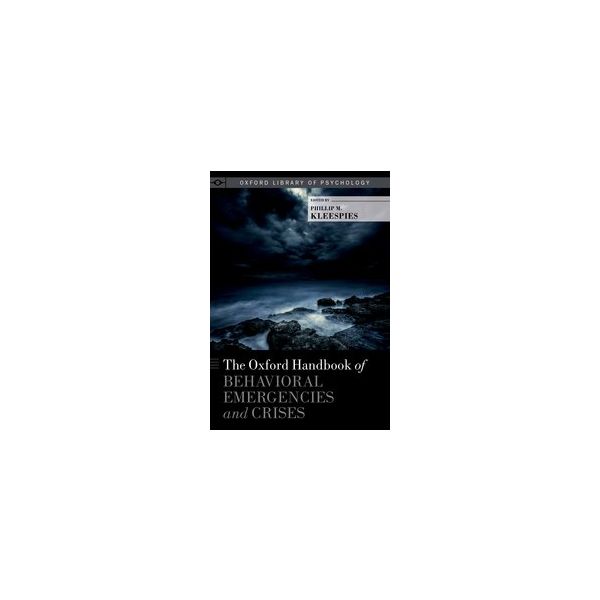| Table Of Content |
Section I: A Framework for Practice and Training
Chapter1. Introduction
Phillip M. Kleespies
Chapter 2. Integrative Perspectives on Behavioral Emergencies and Crises
Phillip M. Kleespies
Chapter 3. Training for Decision Making under the Stress of Emergency Conditions
Phillip M. Kleespies
Section II: Behavioral Emergencies with Youth
Chapter 4. The Evaluation and Management of Suicide Risk in Adolescents in the Context of Interpersonal Violence
Anthony Spirito, Kimberly O'Brien, Megan Ranney, and Judelysse Gomez
Chapter 5. Evaluating Violence Risk in Children and Adolescents
Randy Borum
Chapter 6. Children as Victims: Preventing and Reporting Child Maltreatment and Abuse
Cynthia Cupit Swenson and Sarah L. Logan
Chapter 7. Bullying and Peer Aggression in Children and Adolescents: Implications for Suicide Management
Samantha Pflum, Peter Goldblum, Joyce Chu, and Bruce Bongar
Chapter 8. Targeted Violence in Schools
Randy Borum
Section III: Behavioral Emergencies with Adults
Chapter 9. Evaluating and Managing Suicide Risk with the Adult Patient
Bruce Bongar, Glenn Sullivan, Victoria Kendrick, and Joseph Tomlins
Chapter 10. Evaluating and Managing the Risk of Violence in Clinical Practice with Adult Patients
Daniel Murrie and Sharon Kelley
Chapter 11.Victims of Violence: Evaluation and Management
Michael R. McCart and Kristyn Zajac
Chapter 12. Evaluating and Managing Suicide Risk in Veterans
Phillip M. Kleespies and Christopher G. AhnAllen
Chapter 13. Assessing Acute Risk of Violence in Military Veterans
Eric B. Elbogen and Robert Graziano
Chapter 14. Intimate Partner Violence: Evaluation of Victims and Perpetrators
Casey T. Taft, Adam D. LaMotte, and Karina S. Gilbert
Chapter 15. Homicide/Suicide
Marc Hillbrand
Chapter 16. Victims of Sexual Violence: Evaluation and Management
Heidi S. Resnick, Kate L. Walsh, and Christal L. Badour
Chapter 17. Abuse of Persons with Disabilities: Prevention and Reporting
Angela Kuemmel
Chapter 18. Decision Support Tools in the Evaluation of Risk for Violence
Adam J. E. Blanchard, Catherine S. Shaffer, and Kevin S. Douglas
Chapter 19. Interventions for Acute Agitation
Stephen M. Strenges and Glenn W. Currier
Chapter 20. The Neurobiology of Suicide and Implicatoiions for Treatment and Prevention
Victoria Arango and Mark D. Underwood
Chapter 21. Neurobiology of Impulsive Aggression
Jennifer R. Fanning and Emil F. Coccaro
Section IV: Behavioral Emergencies with the Elderly
Chapter 22. Working Sensitively and Effectively to Reduce Suicide Risk among Older Adults: A Humanistic Approach
Marnin J. Heisel and Paul R. Duberstein
Chapter 23. Aggression and Violence in the Elderly
Reva B. Klein
Chapter 24. Elder Abuse: Prevention and Reporting
Joah L. Williams, Melba Hernandez, and Ron Acierno
Chapter 25. Medical Illness, Suicide, and Assisted Death
Phillip M. Kleespies
Section V. Crises and Conditions Associated with Behavioral Emergencies
Chapter 26. Non-Suicidal Self-Injury and Its Relation to Suicidal Behavior
Joseph C. Franklin and Matthew K. Nock
Chapter 27. Neurological Disorders and Symptoms Associated with Psychological/Behavioral Problems
Maxine H. Krengel and Roberta F. White
Chapter 28. Endocrine Disorders Associated with Psychological/Behavioral Problems
Tara L. Lauriat and Jacqueline A. Samson
Section VI. The Treatment of Patients with Recurrent or Ongoing Risk
Chapter 29. The Psychopharmacological Treatment of Individuals at Risk of Recurrent Suicidal Behavior
John C. Bradley
Chapter 30. Interventions for the Reduction of Violence by Persons with Serious Mental Illnesses
Kevin S. Douglas, Tonia L. Nicholls, and Johann Brink
Chapter 31. The Psychological Treatment of Victims of Interpersonal Violence
Monica M. Fitzgerald and Nyla Nassar
Section VII: Legal, Ethical, and Psychological Risk Management
Chapter 32. Legal and Ethical Risk Management with Behavioral Emergencies
Dana Lockwood, Houri Parsi, Wendy Packman, and Bruce Bongar
Chapter 33. The Duty to Protect
James L. Werth, Jr.
Chapter 34. When Negative Events Happen: Dealing with the Stress
Phillip M. Kleespies, Basak Efe, and Rebecca Ametrano
Section VIII: Conclusion
Chapter 35. Future Directions and Conclusion
Phillip M. Kleespies
Index
|





